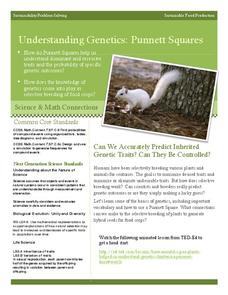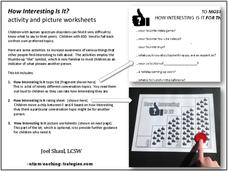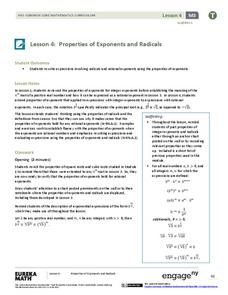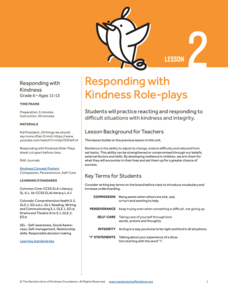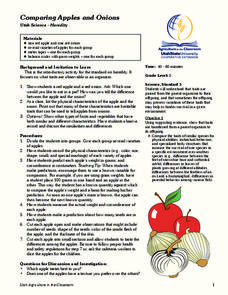Western Kentucky University
Understanding Genetics: Punnett Squares
Can scientists really predict genetic outcomes or are they simply making a lucky guess? Scholars first learn about Gregor Mendel and how to make Punnett squares. Then they extract DNA from a strawberry in a lab with included conclusion...
Curated OER
Tiles, Blocks, Sapphires & Gold: Designing a Treasure Map
Young cartographers in groups hide treasure at school and then create a map to find it using pattern blocks and tiles. They make paintings with clues to create a visual representation of the location of their treasure. Groups present...
Novelinks
The Devil’s Arithmetic: Personal Narrative Assignment
How can an unfamiliar place help you learn something about yourself? Use a narrative writing prompt as you culminate your unit on Jane Yolen's The Devil's Arithmetic. Kids consider the ways that, like the main character from the...
Early Childhood Learning and Knowlege Center
My Body My Senses
In a comprehensive unit of activities, learners explore the five senses. Youngsters discover the many different body parts and their functions that allow humans to have sense of sight, touch, smell, taste, and hearing. The best way to...
Reach Out!
How to Set a Goal
Inspire scholars to reach for the stars with a handy two-page document that details why setting goals is important, how to begin the process, and three steps to set and meet goals.
Curated OER
Abortion
Abortion has remained a highly controversial issue ever since the landmark 1973 Roe v. Wade decision. Using the website, learners sift through all the information they need to participate in a debate about the topic. They learn about the...
Mathematics Assessment Project
Representing Quadratic Functions Graphically
Sometimes being different is an advantage. An engaging activity has scholars match cards with quadratic functions in various forms. Along the way, they learn about how each form highlights key features of quadratic functions.
Curated OER
How Interesting Is It?
Discussing topics that other people are interested in is a key social skill that can often be overlooked. Here is a resource that supports learners in developing this life skill by first prompting them to consider a wide range...
Dick Blick Art Materials
A.T.C. (Artist Trading Cards)
Trade 'em, flip 'em, save 'em. Yes, it's trading cards! Kids design their own artist trading cards, complete with images and stats.
Josephson Institute
Trustworthiness
Build trust—literally—with a lesson plan that sparks reflection, grand conversation, and creativity. Scholars construct a trust tower out of blocks showcasing a picture that represents a good deed they have done to gain trust from their...
Breaking News English
The World Is 0.28% More Peaceful Than a Year Ago
Some days, the world seems like it is becoming darker, but research suggests that the world might actually be becoming a more peaceful place. An informational reading passage accompanied by a series of activities builds English language...
Teach Engineering
Determining Densities
Don't be dense—use a robust resource. The second installment of a five-part Floaters and Sinkers unit has learners determine the densities of several objects. As part of the activity, they learn the displacement method for finding...
UNICEF
Knowing Your Risk for HIV/AIDS
What are the various ways people can become infected with HIV? Build awareness with your pupils and dispel common myths on the transmission of HIV with this resource, which includes a brainstorming activity, group discussion,...
EngageNY
Properties of Exponents and Radicals
(vegetable)^(1/2) = root vegetable? The fourth installment of a 35-part module has scholars extend properties of exponents to rational exponents to solve problems. Individuals use these properties to rewrite radical expressions in...
Facebook
Reputation
What's the key to maintaining a good reputation? Keep your friends close—and your secrets even closer! Social scholars score a deeper understanding of sharing during a instructional activity from a privacy and reputation module....
Random Acts of Kindness Foundation
Responding with Kindness Role-plays
Thank you. Excuse me. I'm sorry! Pupils watch a video about encouraging things people should say more often. Next, they work in small groups to develop a role-play based on a difficult situation. They perform their role-plays for the...
Illustrative Mathematics
Christina's Candies
Help Christina figure out how many chocolate and lemon candies she has with a lesson on decomposing numbers. When presenting this context to the class, the teacher chooses the total number of candies and the number that are chocolate,...
NOAA
Ocean Acidification
If tap water is more acidic than ocean water, why are we so concerned about ocean acidification? The third installment of a 23-part NOAA Enrichment in Marine sciences and Oceanography (NEMO) program focuses on carbon dioxide levels in...
Curated OER
Food Classification
Students are introduced to classification and some of the difficulties surrounding classification and how classification systems need to be able to adapt and how they may need to be changed when new information is discovered. They...
Curated OER
Critter Clues
Students work together to examine water quality. They identify the indicators of water quality and complete an experiment. They discuss their results.
Curated OER
Ecosystems
With a variety of multiple choice and short answer questions, the handout found here could be used in many ways in the classroom: pretest/posttest, study guide, reading guide, or entry/exit questions. There is not a lot of space for...
Curated OER
Animals and Humans Say the Darnedest Things
Students explore and analyze human and animal communications and create a short film that illustrates their findings.
Curated OER
Comparing Apples and Onions
Fifth graders observe and compare apples. In this apples lesson, 5th graders work in groups to record the physical characteristics of a variety of apples. Students predict each apples weight and then weigh them to see if they were...
Curated OER
I am a Hero for Animals!
Students explore the humane treatment of animals. In this character development and civic responsibility lesson, students define "hero" and brainstorm related attributes. Students complete an action plan using the "rational approach"...
